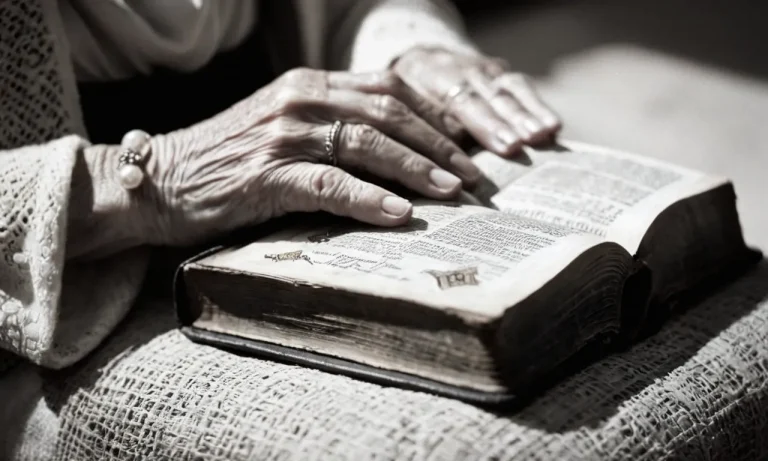Bible Characters Who Were Pure In Heart
The Bible has many examples of godly men and women who exemplified purity of heart. In a world filled with sin and temptation, these heroes of faith persevered in righteousness by keeping their focus on God and walking in obedience to His word.
If you’re short on time, here’s a quick answer to your question: Some notable bible characters known for their purity of heart include Joseph, Daniel, Ruth, Mary, and John.
In this article, we will explore the lives of biblical figures who guarded their hearts and maintained moral integrity despite challenging circumstances. By examining their stories, we can gain wisdom for pursuing wholehearted devotion to God in our own lives today.
Joseph
Remaining righteous as a slave and prisoner
Joseph’s story begins when his brothers, fueled by jealousy, sell him into slavery in Egypt (Genesis 37:12-36). Despite this injustice and traumatic separation from his family at a young age, Joseph maintained his integrity and character.
Though a slave in Potiphar’s house, Joseph worked diligently and served with excellence (Genesis 39:2-6). Recognizing Joseph’s exceptional capabilities, Potiphar appointed him as overseer.
However, Joseph faced another great trial when Potiphar’s wife attempted to seduce him. Joseph refused, stating it would be a sin against God and a betrayal of Potiphar’s trust (Genesis 39:7-12). Enraged by the rejection, Potiphar’s wife falsely accused Joseph of making advances on her.
As a result, Joseph was thrown into prison based on a lie. Still, he did not harbor bitterness or resentment.
Even in dire circumstances, Joseph kept his faith and continued using his administrative talents. Soon he was put in charge of all the other prisoners (Genesis 39:19-23). Throughout over a decade of slavery and imprisonment, during his most vulnerable and trying years, Joseph persisted in living up to his convictions.
His steadfast righteousness stems from an unshakable trust in God’s purpose and provision.
Resisting sexual temptation from Potiphar’s wife
Joseph was a strikingly handsome young man (Genesis 39:6), yet he refused the persistent sexual advances of Potiphar’s wife. Her attraction to Joseph was probably inflamed by the forbidden, the dangerous, and the daring. Joseph, a mere household slave, had little power to resist.
Still, he rebuffed her inappropriate efforts out of loyalty to his master Potiphar.
Moreover, Joseph recognized that yielding to her lustful urges would be offensive to God. Having lost so much already, he remained determined not to forfeit his clear conscience and relationship with God. Joseph’s moral fortitude likely flowed from devoted spiritual discipline.
Earlier in his life, his dreams and prophetic gifts hint at a vibrant friendship with God cultivated through prayer and worship.
Joseph’s refusal of Potiphar’s wife, though personally costly, serves as a shining example of integrity. He valued righteous principle over self-interest. Joseph chose protecting Potiphar’s marriage, upholding God’s standards, and retaining personal purity over satisfying momentary pleasures.
His courage to do what is right, even when it led to a prison cell, ultimately paved the way for saving Egypt and his own family during a severe famine.
Joseph’s resistance highlights an important lesson for people in every generation. When faced with temptation, the faithful choice may demand immediate sacrifice but will lead to better long-term outcomes.
Joseph’s story calls people of faith to stand firm in their convictions despite surrounding hostility or opposition.
Daniel
Maintaining devotion to God in a pagan culture
As a young man taken captive to Babylon, Daniel found himself immersed in a secular, pagan culture that contradicted his Jewish faith and values. Yet he maintained his devotion to God through consistent prayer and obedience to the laws and customs of his faith (Daniel 6:10).
When granted a position of power in the Babylonian and Persian empires, Daniel used his influence to stay true to his convictions rather than compromise them to fit in or achieve worldly success. His unwillingness to bend is evident in episodes like his refusal to eat the king’s food, which would have violated Jewish dietary laws (Daniel 1:8-16).
Daniel’s steadfast commitment strengthened his resolve and positioned him to rise in leadership without abandoning the foundational principles guiding his life.
Willingness to face death rather than compromise convictions
Daniel demonstrated on multiple occasions that he would rather lose his life than violate his beliefs or worship foreign gods. After Nebuchadnezzar erected a large golden statue and decreed that all must bow down to it, Daniel’s three friends refused, saying, “If we are thrown into the blazing furnace, the God we serve is able to deliver us from it…But even if he does not…we will not serve your gods” (Daniel 3:17-18).
Their willingness to be martyred rather than compromise emboldened Daniel as well later in life when he continued to pray to God even after praying was outlawed. After Daniel was thrown into the lions’ den for persisting in prayer, God shut the mouths of the lions, sparing Daniel’s life.
Still, Daniel had resolved he would rather die than cease praying to God (Daniel 6). At every turn, Daniel and his friends proved their devotion through a willingness to surrender their lives.
Ruth
Loyalty and sacrifice for her mother-in-law Naomi
Ruth’s story begins when famine strikes her hometown of Moab. She, along with her husband and father-in-law, decide to migrate to Judah with her mother-in-law Naomi. Tragically, Ruth’s husband dies shortly after their arrival.
However, Ruth remains steadfastly loyal to Naomi, refusing to abandon her even after Naomi encourages her to return home and remarry. Ruth famously tells Naomi, “Where you go I will go, and where you stay I will stay. Your people will be my people and your God my God” (Ruth 1:16).
As a childless widow in ancient Israel, Ruth faced extreme vulnerability and hardship. By choosing to remain with Naomi, she sacrificed the possibility of remarrying and having her own family. Instead, she committed herself to caring for her grieving and aging mother-in-law.
Ruth worked tirelessly to provide food for them both by gathering leftover grain in the fields near Bethlehem. She endured the harsh conditions of a foreign land and people to support Naomi.
Integrity and moral purity in her relationship with Boaz
While gleaning in the fields, Ruth meets Boaz, a kind, wealthy landowner who allows her to continue gathering grain from his lands. As they get to know each other, Boaz is struck by Ruth’s strong character and reputation for moral integrity.
According to the custom at that time, as the closest eligible kinsman, Boaz had the responsibility to marry Ruth and carry on her deceased husband’s family line.
One night, Ruth secretly goes to the threshing floor where Boaz is sleeping and asks him to fulfil this duty. Boaz commends Ruth for not running after younger men but seeking protection through the proper channels. However, there is another relative who is first in line.
The next day, Boaz meets with this man and gives him the chance to marry Ruth. When he declines, Boaz takes Ruth as his wife.
Throughout their interactions, Ruth acts honorably and avoids any immoral behavior, solidifying her reputation as a woman of virtue. Boaz admires these traits and believes she will be an excellent wife. Their marriage is based on mutual honor and respect.
Ruth’s story illustrates that character and integrity matter more than circumstances or social status.
Mary
Her pure and humble character as the mother of Jesus
Mary was a young woman of incredible faith and virtue. When the angel Gabriel appeared to her and told her she would give birth to the Messiah, she responded with pure obedience to God’s will, despite the potential for being misunderstood and rejected by society (Luke 1:26-38).
Throughout Jesus’ life, Mary was a constant source of support, love and guidance, though she often had to watch her son suffer rejection and persecution. She displayed incredible strength and perseverance as she followed Christ even to the cross, where Jesus entrusted her into the care of His beloved disciple John (John 19:25-27).
Mary’s pure and humble character is evident in her prayer, commonly known as the Magnificat, recorded in Luke 1:46-55. She praised God for choosing her, a humble peasant girl, to be the mother of the Savior.
Mary recognized that this was an act of God’s mercy and grace, not because of any merit of her own. She glorified God for lifting up the lowly and filling the hungry with good things. Mary displayed a deep understanding of God’s faithfulness to His promises and His heart for justice.
Walking in obedience to God despite social stigma
When Mary became pregnant before marriage, she faced potential social disgrace and rejection. Yet she courageously trusted God despite the uncertainty of her future. Mary visited her relative Elizabeth during her pregnancy (Luke 1:39-56), probably seeking understanding and support.
Yet she returned to her village of Nazareth to face the consequences of her mysterious pregnancy, trusting that God was in control.
Joseph sought to end their engagement quietly when he discovered Mary was pregnant, but an angel told him the child was from the Holy Spirit (Matthew 1:18-25). Joseph took Mary as his wife, protecting her reputation and virtuous character by marrying a pregnant woman.
Despite the social stigma, Mary and Joseph obeyed God’s calling, trusting He had a greater purpose.
Mary raised Jesus faithfully, though she likely faced skeptics and gossip about His conception and birth. She pondered the meaning of Simeon’s prophecy about a sword piercing her soul (Luke 2:35), accepting the real possibility of suffering in obedience to God’s will.
As Jesus carried out His ministry, Mary continued to trust Him, even when His teachings and miracles seemed beyond understanding (Luke 2:41-51, John 2:1-12).
John
Known as the “disciple whom Jesus loved”
John was one of the twelve disciples of Jesus and is traditionally considered the author of the Gospel of John, the three Johannine epistles, and the Book of Revelation. He was the younger brother of James and the son of Zebedee and Salome.
John likely was born and raised in Galilee and was a fisherman before becoming a disciple of Jesus. He was part of Jesus’ inner circle and witnessed many of Jesus’ miracles and sermons firsthand. The Gospel of John refers to him as “the disciple whom Jesus loved” (John 13:23; 19:26; 20:2; 21:7,20), highlighting the close relationship between Jesus and John.
John is believed to be the only one of the Twelve Apostles who did not die a martyr’s death, living to an old age in Ephesus. Early church tradition holds that John served as bishop of Ephesus. The early 2nd century writer, Irenaeus, called John the “beloved disciple” and said he wrote his Gospel while living in Ephesus.
Most biblical scholars believe the Gospel of John was not written directly by the apostle John, but by an anonymous follower, drawing on the apostle’s teachings and traditions. Regardless of its precise authorship, the Gospel provides a unique perspective on Jesus’ life and ministry.
Boldly proclaiming the gospel message despite persecution
According to tradition, the Roman emperor Domitian (reigned 81–96 AD) ordered John’s arrest and sent him to Rome, where he was beaten, poisoned, and thrown into boiling oil. However, he miraculously suffered no ill effects from these events.
Domitian then exiled John to Patmos, where John received and recorded his prophetic visions in the Book of Revelation.
In his later years, John traveled extensively spreading the gospel message and church tradition credits him with founding churches at Smyrna, Pergamos, Sardis, Philadelphia, Laodicea, and Ephesus, where he remained for the rest of his life.
Even in his old age, John continued boldly proclaiming the message of salvation through Christ in the face of persecution. A touching story from early church history describes how John would often preach just one simple message: “Little children, love one another.”
When asked why he always said this, John replied, “It is the Lord’s command, and if this alone be done, it is enough.”
John’s writings, especially his gospel and letters, exerted great influence over the early church and remain profoundly meaningful for Christians today. He presents a high Christology, equating Jesus with the eternal Word of God.
His teachings on light, life, truth, love, and the Paraclete (Holy Spirit) continue to shape Christian belief and practice. John also provides a model of faithful endurance, risking persecution and exile to spread the light of Christ to the world.
Conclusion
Throughout history, God has used men and women of upright heart to carry out His purposes. Though we live in an age of moral decline, the examples of biblical heroes like Joseph, Daniel, Ruth, Mary, and John remind us integrity and righteousness still matter deeply to God.
May their stories inspire us to guard our hearts, reject sin’s fleeting pleasures, and walk in pure devotion to our Lord Jesus Christ.








